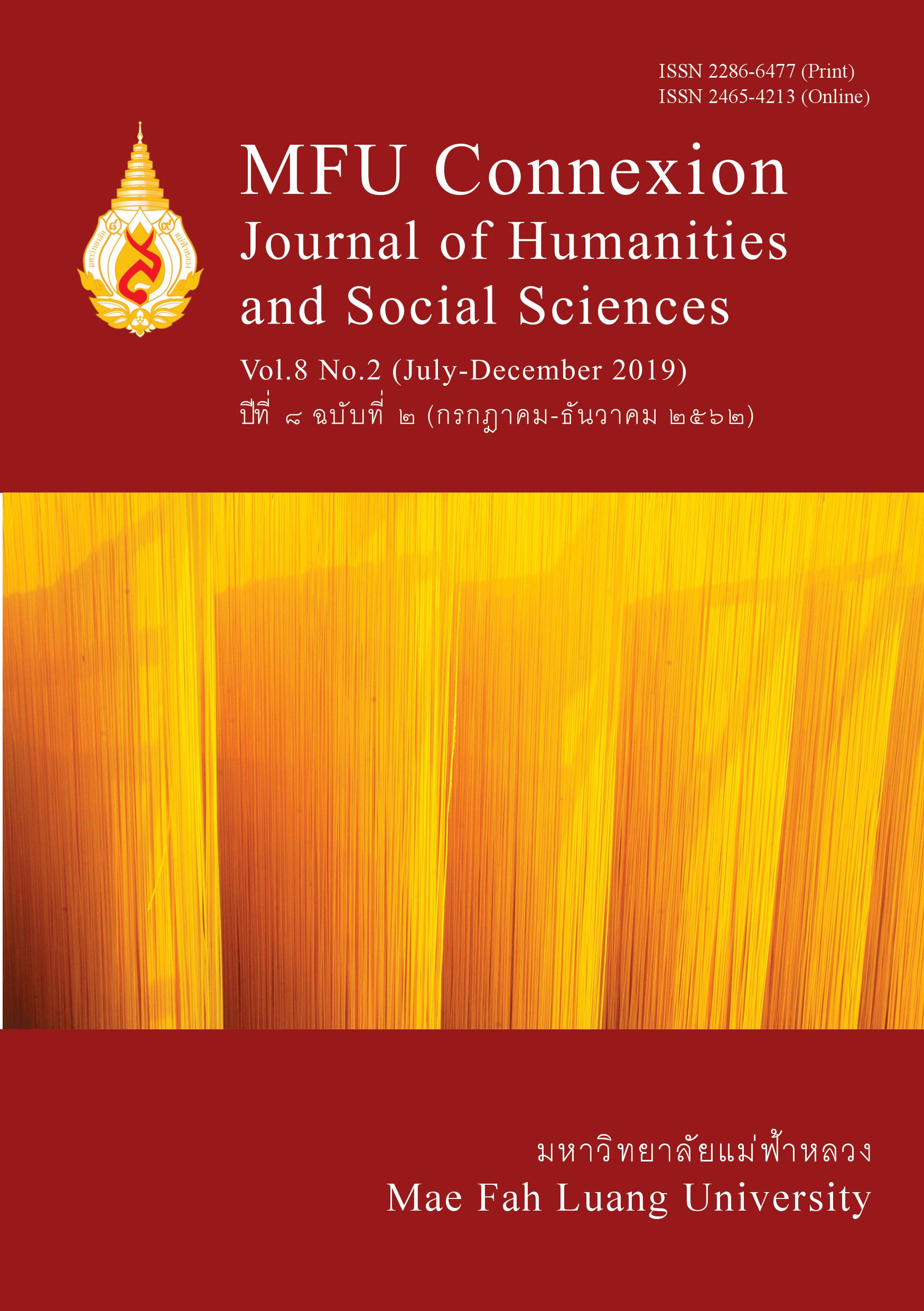A Study of Speech Acts on the Best Protest Songs of All Time (in Thai)
Main Article Content
Abstract
This research is a study of speech acts in the best protest songs of all time. The objectives of this research are (1) to classify the speech acts which appeared on the protest songs base on John R. Searle's speech acts theory (1969) (2) to study direct and indirect illocutionary act which appeared in the protest songs (3) to study what the songs often encourages audiences to do and what language strategies are used to influence them. The researcher collected a list of 10 protest songs that were rated on the Rolling Stone website in 2014 as 10 best protest songs of all time. And all lyrics are taken from the Genius.com. To analyze the protest songs, the utterances from each song were analyzed. One sentence structure in English was considered as one utterance. It may contain words, phrases, and clauses as part of it. Besides, the sentence that was repeated in the chorus of the songs were not counted repeatedly. The results showed that (1) in a total of 180 utterances from ten protest songs, four types of illocutionary acts were found. 84 utterances were expressives, 67 utterances were representatives, 24 utterances were directives and six utterances were commissives. The speech acts of expressing opinions, irony and blaming were the three speech acts most frequently found. They were often used to express the songwriter’s emotions and attitudes towards social events. (2) 87 utterances were the direct illocutionary act and 94 utterances were the indirect illocutionary act. Indirect speech acts were often used in lyrics that contain the content of social satire or social criticism. (3) most of the protest songs use expressive speech acts to motivate listeners to be emotionally involved in the event which may lead them to decide to fight for something by themselves.
Article Details
Copyright
Connexion: Journal of Humanities and Social Sciences has an exclusive right to publish the accepted articles in any form. However, the author retains the following rights:
1. The right to the ownership of the article;
2. The right to use all or part of the article in his/her other works;
3. The right to re-produce the article for personal use or for use in the author’s organisation, in which case the author must obtain permission from Connexion: Journal of Humanities and Social Sciences;
4. The right to make copies of all or part of the work for educational use or for the author’s use in classroom teaching; and
5. The right to include the work (both the preprinted and printed versions) in an institutional repository.
References
About Genius. (n.d.) Available: https://genius.com/Genius-about-genius-annotated [20 May 2019]
Austin, J. L. (1962) How to do things with words, Oxford: Clarendon Press.
Cerf, W. (1966) How to do things with words. by J. L. Austin, Mind, vol. 75, no. 298, pp. 262-285.
Deepadung, S. (2009) Introduction to pragmatics (วัจนปฏิบัติศาสตร์เบื้องต้น), 2nd edition, Bangkok: Samlada. (in Thai)
Denisoff, R. S., & Levine, M. H. (1971) The popular protest song: The case of "Eve of Destruction", The Public Opinion Quarterly, vol. 35, no. 1, pp. 117-122.
E-DUANG. (2018) Development of the protest song "Sansaengthong" to "Pratet Gumee" (พัฒนาการของเพลงประท้วง “สานแสงทอง” ถึง “ประเทศกูมี”), Available: https://www.matichonweekly.com/e-daung/article_140877 [20 July 2019] (in Thai)
Khompramoon, N., et al. (2018, July) Speech acts in love counseling by DJ P’AOY in the column “KHON DANG NANG KHEAN” (วัจนกรรมในการให้คำปรึกษาเรื่องความรัก ในคอลัมน์คนดังนั่งเขียนของดีเจพี่อ้อย), Paper presented at the 9th Hatyai National and International Conference, pp. 119-130, Blue Ocean Hall, Hatyai Business School Building Hatyai University, 20-21 July 2018. (in Thai)
Khraiboot, A., & Kingkham, W. (2016) Speech acts in patriotic songs during B.E. 2510-2550 (วัจนกรรมในบทเพลงปลุกใจให้รักชาติ ระหว่าง พ.ศ. 2510–2550), Nakhon Phanom University Journal, vol. 6, no. 1, pp. 61-69. (in Thai)
Office of the Royal Society. (2017) Dictionary of linguistics (general linguistics) (พจนานุกรมภาษาศาสตร์ ภาษาศาสตร์ทั่วไป), Bangkok: Royal Society. (in Thai)
Pengsuriya, N. (2006) The usage of stigmatized expressions in Thai (การใช้ภาษาเพื่อแสดงการตำหนิของคนไทย), Master’s thesis of Arts, Thammasat University, Bangkok. (in Thai)
Protest song. (n.d.) Available: https://www.encyclopedia.com/arts/dictionaries-thesauruses-pictures-and-press-releases/protest-song [19 March 2019]
Quirk Cort, M. E. (2013) The power of lyrical protest: Examining the rhetorical function of protest songs in the 2000s, Master’s thesis of Science, Rochester Institute of Technology, New York.
Searle, J. R. (1969) Speech acts: An essay in the philosophy of language, Cambridge: Cambridge University Press.
Searle, J. R. (1979) Expression and meaning: Study in theory of speech acts, Cambridge: Cambridge University Press.
Sungkaman, U. (2016) Linguistic strategies used in satirical discourse to create the Thai sense of humor (กลวิธีทางภาษาในวัจนกรรมเสียดสี เพื่อสร้างความตลกขบขันของไทย), Humanities Journal, vol. 23, no. 1, pp. 154-178. (in Thai)
Sutherland, S. (2016) A beginner’s guide to discourse analysis, London: Palgrave.


